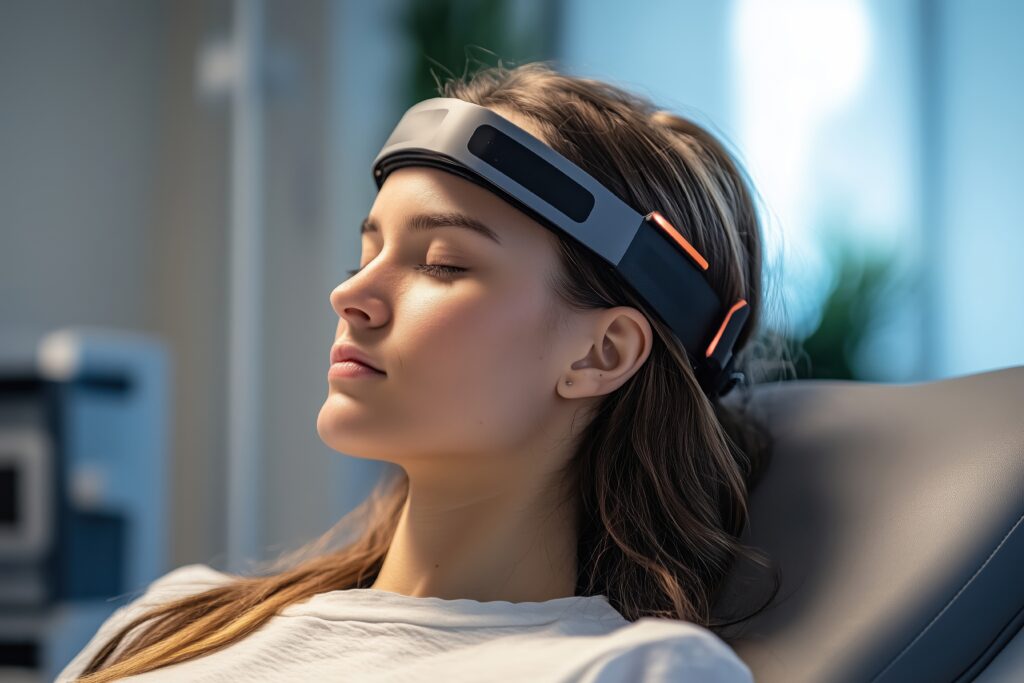Mental health conditions affect millions of people worldwide, creating significant challenges for individuals’ daily lives and overall well-being. While traditional treatments such as medication and psychotherapy are effective for many, not everyone responds to these approaches. This has led to growing interest in alternative treatments. One such innovative treatment is Transcranial Magnetic Stimulation (TMS). But, can TMS therapy for mental illness truly make a difference? Let’s delve into the workings, benefits, and effectiveness of this treatment.
What is TMS Therapy?
Transcranial Magnetic Stimulation (TMS) is a non-invasive procedure that uses magnetic fields to stimulate nerve cells in the brain. Primarily known for treating depression, TMS has also shown promise in addressing a variety of other mental health conditions. During a TMS session, an electromagnetic coil is placed near the patient’s head, delivering magnetic pulses to specific regions of the brain. These pulses can modulate neural activity, potentially alleviating symptoms of mental health disorders.
How Does TMS Therapy Work?
The magnetic pulses used in TMS therapy target the prefrontal cortex, a part of the brain involved in mood regulation. The stimulation can enhance neural connectivity and correct irregular brain activity patterns found in mental health conditions. Unlike electroconvulsive therapy (ECT), TMS does not require anesthesia, and it tends to have fewer side effects, making it a gentler option for many patients.
Effectiveness of TMS Therapy for Mental Illness
Transcranial Magnetic Stimulation (TMS) therapy has emerged as a groundbreaking treatment for various mental health conditions, offering an alternative option for individuals who haven’t found relief through traditional therapies. TMS is a non-invasive procedure that uses magnetic fields to stimulate specific areas of the brain, which can help alleviate symptoms of depression, anxiety, PTSD, and other mental illnesses. With growing evidence supporting its effectiveness, TMS therapy is gaining recognition as a safe and powerful tool in the fight against mental health challenges, providing hope for individuals seeking lasting relief and a better quality of life.
Major Depressive Disorder (MDD)
One of the most well-documented applications of TMS therapy for mental illness is its effectiveness in treating Major Depressive Disorder. Numerous studies have shown that TMS can significantly reduce depressive symptoms, particularly in individuals who have not responded to conventional treatments. According to the American Psychiatric Association, TMS is a promising option for patients with treatment-resistant depression.
Anxiety Disorders
Research indicates that TMS therapy can also be beneficial for anxiety disorders, including Generalized Anxiety Disorder (GAD) and Obsessive-Compulsive Disorder (OCD). The magnetic stimulation helps modulate the brain regions associated with anxiety, thereby reducing symptoms and improving overall mental health.
Post-Traumatic Stress Disorder (PTSD)
Emerging studies suggest that TMS therapy may offer relief for individuals with PTSD. The treatment can target the neural circuits involved in the processing of traumatic memories, which may alleviate the intensity of PTSD symptoms.
Other Mental Health Conditions
Though the research is still in early stages, TMS therapy is being explored for various other mental health disorders, including Bipolar Disorder and schizophrenia. Early results indicate potential benefits, but further studies are needed to fully understand its efficacy in these areas.
Benefits of TMS Therapy
Transcranial Magnetic Stimulation (TMS) therapy offers a range of benefits for individuals struggling with mental health conditions, particularly those who have not responded well to traditional treatments like medication or psychotherapy. This non-invasive procedure uses magnetic pulses to stimulate specific areas of the brain, helping to improve mood, reduce symptoms, and promote overall mental wellness. Some of the key benefits of TMS therapy include minimal side effects, no need for anesthesia, and the potential for lasting improvements in mental health. As more people turn to TMS therapy, its effectiveness continues to shine, offering a promising solution for those seeking relief from depression, anxiety, PTSD, and other mental health conditions.
Non-Invasive and Safe
One of the primary advantages of TMS therapy for mental illness is its non-invasive nature. Patients remain awake and alert during the procedure, which typically lasts about 20-40 minutes. The treatment is safe, with the most common side effects being mild headaches or scalp discomfort, both of which usually resolve quickly.
Drug-Free
TMS therapy does not involve the use of medications, making it a suitable option for individuals who prefer to avoid or cannot tolerate pharmaceuticals. This aspect is especially beneficial for patients with medication-resistant conditions or those experiencing severe side effects from drugs.
Customizable Treatment
TMS therapy can be tailored to the individual needs of the patient. The treatment parameters, such as the intensity and frequency of the magnetic pulses, can be adjusted to optimize effectiveness and minimize discomfort.
Considering TMS Therapy?
While TMS therapy shows considerable promise, it is crucial to consult with a qualified healthcare provider to determine if it is the right option for you. The effectiveness of TMS can vary from person to person, and a thorough evaluation will help ensure that you receive the most appropriate treatment for your specific needs.
Get Professional Mental Health Treatment with TMS Therapy in MA Today
If you’re curious about whether TMS therapy can help treat your mental health condition, the Massachusetts Mental Health Treatment Center team is here to assist. Our experts provide comprehensive mental health programs in MA that include TMS therapy and other innovative treatments tailored to your well-being. Contact us today to learn more about our services and discover how we can support your journey to better mental health.
TMS therapy has shown significant potential in treating a variety of mental health conditions. Whether you’re struggling with depression, anxiety, PTSD, or other disorders, exploring TMS therapy in Massachusetts under professional guidance might provide the relief you need. Mass MH is dedicated to offering personalized and effective mental health solutions. Don’t hesitate to reach out and take the first step toward achieving a healthier, happier life.










